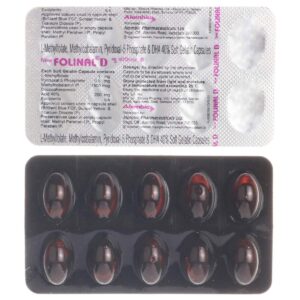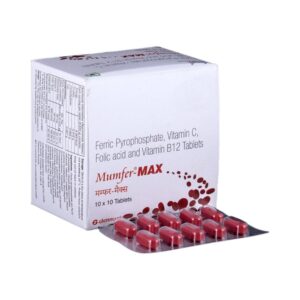FOLIC ACID + IRON III HYDROXIDE POLYMALTOSE COMPLEX
Folic Acid: Folic Acid, also known as Vitamin B9, is a water-soluble vitamin that is essential for numerous biological processes in the body. It is primarily used as a dietary supplement to treat or prevent folic acid deficiency and certain types of anemia. It may also be prescribed for women who are pregnant or planning to become pregnant to help prevent certain birth defects, such as neural tube defects.
The main mechanism of action of folic acid is its involvement in the synthesis and repair of DNA and RNA. It plays a crucial role in cell division and growth, making it important for the proper development of red blood cells, nerve cells, and other body tissues. Folic acid is also involved in the metabolism of certain amino acids and the production of neurotransmitters.
The recommended dose of folic acid varies depending on the specific condition being treated. For most adults and children, the recommended daily intake is 400-800 micrograms (mcg). Pregnant women are often advised to take a higher dose, typically 600-800 mcg, to support fetal development.
While folic acid is generally considered safe when taken at recommended doses, it can cause some side effects. These include nausea, diarrhea, abdominal cramps, and allergic reactions. In rare cases, high doses of folic acid may mask vitamin B12 deficiency, which can lead to neurological problems if left untreated. It is important to speak with a healthcare provider before starting folic acid supplementation, especially if you have any underlying medical conditions or are taking other medications.
Iron Iii Hydroxide Polymaltose Complex: Iron III Hydroxide Polymaltose Complex is a medication used for the treatment of iron deficiency anemia. It is a complex containing iron III hydroxide and maltose, which helps in the absorption and transport of iron in the body.
The mechanism of action of Iron III Hydroxide Polymaltose Complex involves the release of elemental iron in the small intestine. Once absorbed, it binds to transferrin and is transported to various tissues where it may be incorporated into red blood cells as hemoglobin or stored as ferritin. This helps in the production of new red blood cells, increasing the hemoglobin level in the blood.
The recommended dose of Iron III Hydroxide Polymaltose Complex depends on the severity of iron deficiency and the patient’s age. It is usually given orally and can be taken with or without food. The dosage may vary from 100 mg to 150 mg elemental iron per day.
Common side effects of Iron III Hydroxide Polymaltose Complex include gastrointestinal disturbances such as nausea, constipation, diarrhea, and stomach discomfort. These side effects are usually mild and transient. In some cases, iron therapy may lead to darkening of stool, which is a harmless side effect but can be alarming to patients.
It is important to note that Iron III Hydroxide Polymaltose Complex should be used with caution in patients with hereditary hemochromatosis or other conditions where iron accumulation may occur. It should also be avoided in patients with known hypersensitivity to any of its components.
Overall, Iron III Hydroxide Polymaltose Complex is an effective treatment option for iron deficiency anemia, providing an essential nutrient to support the production of red blood cells. However, it is advisable to consult a healthcare professional for appropriate dosing and to discuss any potential side effects or interactions with other medications the patient may be taking.


